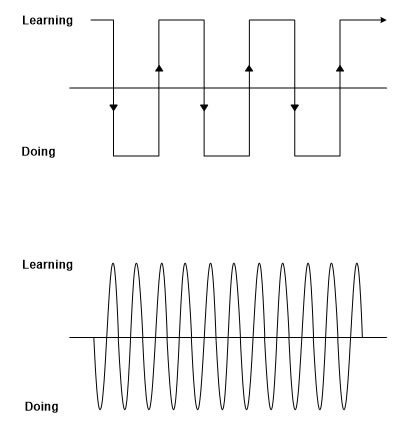Leaders must be built “on the job.” This involves two things.
First, the context for learning should be as similar as possible to the future leader’s ultimate ministry environment. For example, if the future ministry of the worker will involve sleeping on a concrete floor and eating only one meal a day, then that should be his lifestyle while in training. Jesus built His emerging leaders in the same context in which they would ultimately be leading, rather than a protected, artificial environment, the nature of which will never be duplicated for the rest of their lives.
Second, the learning itself must involve doing. People learn by doing. Therefore, an effective leader development process integrates “classroom” instruction time with practical “in the field,” “hands-on” ministry.
Jesus Built His Disciples “On the Job”
Jesus built His emerging leaders “on the job” where they dealt with real problems, explored real opportunities and faced real consequences. Jesus spent some time instructing His disciples, but then He always sent them out to do ministry.
Jesus also taught His disciples as He took them with Him. Sometimes He would be with them; other times, He would send them out by themselves. When He said, “Look on the fields; the harvest truly is great,” He was in the midst of visible need. The harvest field was not something found on a map on the wall, but was rather portrayed in the needs of the sick and sinful multitudes that were surrounding them on every side. Jesus taught His disciples and then sent them out to preach and to heal the sick. When they failed, as in the case of the man with the epileptic son (Matt. 17:14-21) or Peter (John 21:15-19), He gave them further instruction. He taught them as they ministered.
From Jesus’ ministry we see that learning must be integrated with doing. If it is all learning, it soon becomes boring and irrelevant. But when learning is integrated with doing, the doing gives application, context, relevance, reality, meaning, motivation and purpose to the learning. The people actually do learn!
Paul Trained Leaders “On the Job”
In Acts 19, Paul had a learning community in Ephesus where he taught for two years. But this was not classroom instruction only, since from this ministry “all the Jews and Greeks who lived in the province of Asia heard the word of the Lord” (Acts 19:10). As Paul taught, the believers and workers who were raised up under his ministry went out and accomplished this tremendous feat of evangelism. Thus, the New Testament does not preclude “ministry schools,” but it does illustrate “on the job” training.
Paul gave his emerging leaders practical responsibilities and experiences. For example:
- When he wanted to raise up Timothy he took him with him (Acts 16:1-3).
- Silas accompanied Paul not only in the classroom but also in the prison (Acts 16:22-24)!
- Paul left Silas and Timothy in Berea to minister by themselves (Acts 17:14-15).
- Paul left Titus in Crete to establish the new churches (Tit. 1:5).
- Timothy was considered Paul’s “fellow-worker” in the gospel (Rom. 16:21; Phil. 2:22; 1 Thess. 3:2; 1 Cor. 16:10). He ministered as he learned.
- Paul trusted Timothy with several difficult assignments in churches: Thessalonica (1 Thess. 3:1-6), Corinth (1 Cor. 4:16-17; 16:10-11), Philippi (Phil. 2:19-24), and Ephesus (1 Tim. 1:3).
This was how Paul built leaders – he built them “on the job,” integrating learning and doing.
Balancing Learning and Doing
Here are two possible approaches to balancing learning and doing. In the first graphic, there are subsequent blocks of learning and doing. In the second, learning and doing are virtually simultaneous. The second approach is best, when there is engagement in both learning and doing at the same time. This is how Jesus built His disciples.

However, practical or security issues in many countries will dictate the need for the first approach, in which the emerging leaders are in a learning environment for a period of several weeks or months, after which they go out into the field with a ministry mentor for several weeks or months, before returning to the community for more learning.
Once again, here is where the community helps, by providing opportunities for ministry and responsibilities – with real benefits and real consequences – in the very midst of the emerging leaders’ learning.
In conclusion…
Imagine a music student who arrives at violin school. He has never touched a violin but wants to learn to play. During his training at the school he is taught all about the violin: how it is made, its history, its use, how to read music, and the careers of great violinists. But he is never allowed to actually touch the instrument. After several years of this training, he passes the written exam and graduates. After graduation, in front of a large crowd of people, he is finally handed a violin. Expectations are high, since his grades were very good. He is asked to play this violin for everyone. But will he be able to?
An old Chinese proverb says, “Tell me and I’ll forget. Show me and I may remember. Involve me and I’ll understand.” In other words, people learn by doing. There is a part for formal instruction to play in the process, but it is not enough by itself. God uses all the processes of life in the extremely complicated course of building a leader.





